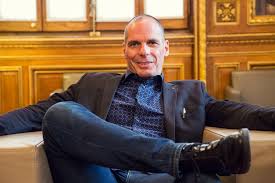Europe: Democratize or Dissipate
Amid a series of political and economic crises, many Europeans have started to doubt the efficacy of the European Union. Within the last few weeks, a movement known as Democracy in Europe 2025 (DiEM) has spread throughout Europe, promising to change the continent’s political landscape. Yanis Varoufakis, the former Finance Minister of Greece, announced the birth of DiEM last December. Its mission, according to the group’s manifesto, is “one very simple, but radical solution: to democratize Europe.” This intellectual crusade seeks to replace the European Union’s current state of “technocratic feudalism,” as Varoufakis has coined it, with transparent, democratic institutions. The DiEM believes that, should certain reforms be implemented, the European Union could experience a democratic resurgence by 2025.

DiEM’s creation arrives at a time of great need for European institutions. The Eurobarometer - an annual public opinion poll of EU member states conducted by the European Commission - reported last year that confidence in the European Union has never been lower. During a debate in November 2015, Varoufakis announced his intention to mitigate this problem, noting that restoring citizens’ trust might not be a matter of complex policy solutions. Instead, it could be as simple as opening meetings of the European Council to the public.
According to DiEM supporters, ongoing negotiations for the Transatlantic Trade and Investment Partnership (TTIP) between the United States and the EU illustrate the extent to which technocratic feudalism is prevalent in EU. Not only have talks been carried out in secret but, as The Independent also reported, the agreement’s text has only recently been released for politicians and scholars to review in special reading rooms. While the TTIP’s effects will significantly impact a large portion of the EU’s 750 million inhabitants, there has been a notorious lack of democratic rigor in its entire drafting.
Founded by 40 intellectuals, activists, and politicians, DiEM has already garnered the attention of thousands across Europe by mobilizing both national left-wing elites and university students. DiEM leaders have noted that, as with the TTIP, the undemocratic nature of the EU means that unelected technocrats prescribe policy suggestions but are accountable to no one.
Although there has been little overt opposition to DiEM thus far, both supporters and detractors have questioned Varoufakis’ role as the movement’s spokesperson. His tenure as Finance Minister earned him a reputation of arrogance throughout Europe’s mainstream media outlets. This was primarily a result of his aggressive attitude towards the so called “men in black suits” of the Troika - a financial committee composed of the IMF, European Commission, and European Central Bank - that oversaw much of Greece’s contentious bailout process. Within Greece, however, Varoufakis enjoyed some of the highest popularity ratings in the country for his dogged determination to resist the Troika’s pressure, according to Newsweek. Furthermore, in the November debate, when asked about the Grexit and the Brexit, Varoufakis responded by saying, “It’s just like the Eagles’ song Hotel California - you can check out any time you like, but you can never leave.”
As DiEM spearheads the revolution to democratize the European Union, it remains to be seen whether Varoufakis’ leadership will suffice to do what he, as Finance Minister, could not: lay down the rules of the game. The EU must democratize or risk losing the last scraps of legitimacy that it has.
Note: This article appeared in an abridged format for print on February 23, 2016.
